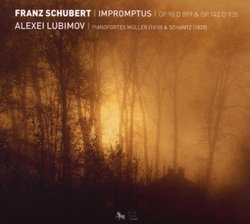Schubert on instruments of his time
Larry VanDeSande | Mason, Michigan United States | 04/26/2010
(4 out of 5 stars)
"Russian pianist Alexei Lubimov recorded Schubert's two sets of Impromptus on a pair of fortepianos from Schubert's time for this recording. Most commentators have called these recordings unsentimental yet poetic. I would agree with those sentiments. I have no previous experience with Lubimov and would say, based on this experience, that he is not a powerful interpreter and that he prefers to let the music speak for itself.
What struck me most about his playing, and what continues to impress me the longer I listen to these miniatures, is how, under Lubimov's hands, the music never sounds like Beethoven or Chopin to me. I don't think it particularly sounds like Schubert, either, but it neither sounds derivative nor remindful of anyone else. In this way, I think it possible Lubimov has located the heart of Schubert but I am not sure about that.
Given that they lived similar lifespans, Schubert and Beethoven often sound alike aside from the obvious singing quality in Schubert's work that is not represented by Beethoven's passion and drive. The last set of the Impromptus I heard, by Irishman John O'Conor Schubert: Impromptus; Waltzes, seemed to me to project qualities of subtlety and imagination I don't hear this time. That is not to say these are poor performances; far from it. They are distinctt without being eccentric so Lubimov's Impromptus defy simple characterization.
Lubimov said in an interview with BBC Music Magazine he chose the two instruments, built by Muller in 1810 and Schantz in 1830, because the music demanded different qualities. "The first piece in the second (D. 935) set of Impromptus requires a bit more extneded range in the keyboard," he said, "and since the extra notes are available ont he 1830 Schantz fortepiano it makes sense to play that instrument."
BBC Music gave this recording a rave, five stars for both the performances and the recording and called it "a beautiful recital by a master pianist." My score doesn't go that far because the musicmaking did not portray to me the poetry or the drama I've heard elsewhere. Most people will probably be interested because these are played on instruments of Schubert's time and, in that regard, this is an interesting program that is well done technically.
I was a bit hamstrung when I bought this because my home was in renovation and my 5.1 home stereo was out of commission, so I only had my car stereo, work PC and laptop on which to play the CD. It sounded good on all but none effectively substitute for hearing in a wider space on better equipment. I doubt this restriction would have changed my opinion of the playing itself, which is very good.
This comes in a cardboard container with a booklet loosely inserted in one end that falls out easily. The notes address the instruments with an essay suggesting the Impromptus are of greater scale and importance than their name implies. This is a provocative issue many will want to hear because of the instruments mated to the wonderful music. I'd recommend it to anyone willing to pay for a full priced issue. Others, or those with reservations about period instruments, should wait until it arrives here in the used CD aftermarket to dabble."


 Track Listings (8) - Disc #1
Track Listings (8) - Disc #1